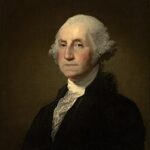The Contradictory Warning
President George Washington’s farewell address warned Americans against the “baneful effects of the spirit of party.” He delivered this message on September 19, 1796. The Washington Farewell Address became one of America’s most quoted political documents. However, critics immediately noticed the irony in his partisan warning. ⚠️
Hamilton’s Federalist Influence
Alexander Hamilton heavily influenced Washington’s anti-party stance in the farewell address. Washington’s administration had become increasingly Federalist in its final years. His policies on banking, taxation, and foreign relations reflected clear partisan preferences. The president sided consistently with Federalist positions against Democratic-Republican opposition.
Creating the Divisions He Condemned
Washington’s own decisions helped create America’s first political parties. His support for Hamilton’s financial system sparked fierce opposition from Jefferson and Madison. The Whiskey Rebellion response and Jay’s Treaty further polarized political factions. 📊 By 1796, two distinct parties had formed around support or opposition to his policies. Critics called his Washington Farewell Address hypocritical given this context.
Impact:
Immediate Political Backlash
Democratic-Republicans immediately criticized the farewell address as partisan propaganda disguised as statesmanlike advice. Thomas Jefferson privately called it Hamilton’s attempt to legitimize Federalist dominance. The address failed to prevent party formation or reduce political tensions. Instead, it became a Federalist campaign document for the 1796 election. 🔥
Strengthening Party System
The Washington Farewell Address ironically accelerated party development rather than preventing it. Democrats used Washington’s Federalist record to argue against his anti-party rhetoric. John Adams inherited a more polarized political landscape than Washington intended. The 1796 election became America’s first truly partisan presidential contest. Party newspapers emerged to defend their respective positions against Washington’s criticism.
Long-term Constitutional Crisis
Washington’s anti-party stance created lasting tensions in American democracy. Future presidents struggled to balance partisan leadership with national unity rhetoric. The farewell address established a tradition of condemning parties while practicing partisanship. 📉 This contradiction weakened public trust in political institutions. Modern scholars view Washington’s position as naive about democratic governance realities. His warning became a symbol of America’s ongoing struggle with partisan polarization.
